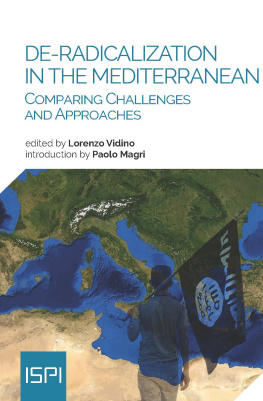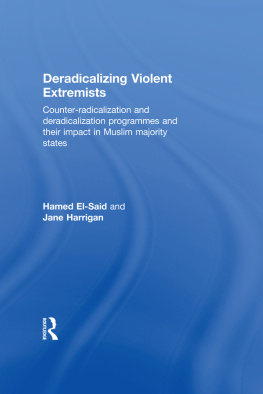2018 Ledizioni LediPublishing
Via Alamanni, 11 20141 Milano Italy
www.ledizioni.it
De-Radicalization in the Mediterranean. Comparing Challenges and Approaches
Edited by Lorenzo Vidino
First edition: July 2018
The opinions expressed herein are strictly personal and do not necessarily reflect the position of ISPI
Print ISBN 9788867058181
ePub ISBN 9788867058174
Pdf ISBN 9788867058198
DOI 10.14672/67058181
ISPI. Via Clerici, 5
20121, Milano
www.ispionline.it
Catalogue and reprints information: www.ledizioni.it
Introduction
In the past few years jihadist terrorism and radicalization have become some of the most critical threats to the Mediterranean region. Terrorist attacks in European, North African and Middle Eastern countries have endangered the thriving spirit of the area. Furthermore, conflicts in Libya, Syria and Iraq have degraded the security situation and paved the way for the emergence of new extremist groups such as the Islamic State and Hayat Tahrir al-Sham. Along with a general rise in homegrown extremism, many Mediterranean countries were the source of a large exodus of foreign fighters who traveled to conflict zones and now face the danger of a return of extremist militants with combat skills and experience. Moreover, as authorities cracked down on terrorist networks, radicalization in prison has become an ever more critical challenge. Countering violent extremism (CVE) has thus become a crucial priority in the area. While the responses of local governments have been varied, with a greater focus on the use of hard-power, repressive measures, the need to add alternative actions of prevention and rehabilitation to the already existing repressive policies has been highlighted by authorities throughout the region. To emphasize this aspect of the fight against extremism, this ISPI report seeks to provide an analysis of the policies and measures adopted to counter violent extremism in different Mediterranean countries. In particular, it sheds light on the practices of the North African and Middle Eastern countries that have been affected the most by this phenomenon and have been at the forefront of the fight on terror, acquiring valuable experience throughout the years.
For this purpose, the experts brought together in this volume illustrate the policies of contrast, prevention and de-radicalization that have been adopted by countries in the MENA region, revealing emerging trends, lessons learned and overviews of the security status of the countries in the area. Their findings demonstrate a diverse approach to CVE that attempts to match and counter the unique local conditions which drive radicalization in each state, while also seeking to provide insight and policy recommendations for CVE measures.
As shown in the report, while radicalization and extremism are a complex global phenomenon, the push and pull factors that mobilize people are usually highly localized and may differ from country to country. Furthermore, radicalization is a very individualized process, making it difficult and counterproductive to make broad generalizations about the factors that may lead to radicalization. Therefore, while extremism represents a common threat to the MENA region, it must be addressed in the manner appropriate to each country.
From this standpoint, the experiences of Mediterranean countries provide important lessons and takeaways because with the new surge of radicalization in the area governments have begun to draft and implement new national counter-terrorism strategies and policies. The ultimate goal of this ISPI report is to examine the measures that have been taken thus far, and offer points of reflection about this complex phenomenon.
In the first chapter, Lorenzo Vidino examines how, while Italy may appear to be a hub for jihadist mobilization and a target, it has not experienced the same surge in radicalization as most European countries. Nonetheless, while Italy has adopted many efficient repressive measures which have been able to address the situation thus far, several signs have emerged that suggest that the nature of radicalization in Italy is evolving and now requires the implementation of new preventive and de-radicalization policies.
Anina Schwarzenbach focuses on the French efforts to counter extremism and radicalization. Differently from Italy, France has been greatly affected by jihadist terrorism in the past few years. Twenty-four jihadist terror attacks have been carried out in the nation since the establishment of the Caliphate and around 1,700 individuals have left the country to fight in Syria and Iraq. Schwarzenbach concentrates on the ongoing social, political and legal debates in the country as well as on the measures that have been taken by French authorities, following attacks in 2014 and 2015, in an effort to prevent radicalization and rehabilitate radicalized individuals into society.
Fernando Reinares and Carola Garca-Calvo delve into Spains approach to countering jihadist extremism following the 2004 Madrid train bombings. The country was equipped with a well-prepared internal security apparatus, with long experience in dealing with internal terrorist groups like the Basque Euskadi Ta Askatasuna (ETA). Furthermore, while the country had a history of jihadist extremist activity prior to the bombings, new counter-terrorism policies were implemented to better deal with jihadist terrorism following the Madrid attacks. The chapter further analyzes how, as the phenomenon evolved in the past few years and the need to implement a soft-power approach became more evident, further policies were enacted in an attempt to stem jihadist radicalization.
Chapter 4, by Jenna Consigli, instead provides an overview of the different approaches to countering violent extremism in North African and Middle Eastern countries, which have thus far been strongly centered around the hard-power approach. Consigli presents different case studies, which explore measures taken in Saudi Arabia, Egypt, Morocco and Tunisia. Her article seeks to provide a clear picture of the recent evolution of policies on the southern shore of the Mediterranean, and examine their issues, challenges and future prospects.
Similarly, El Mostafa Rezrazi provides insights on Moroccos approach to countering violent extremism. Rezrazi analyzes the efficient Moroccan counter-terrorism policy that was enacted following the deadly bomb attacks in Casablanca in 2003. While Morocco has been successful in preventing further terrorist attacks on its soil since 2003, the threat of extremism and radicalization lingers and remains a threat to the security of the kingdom. The chapter focuses on the various aspects of CVE in Morocco, which range from fighting poverty to security measures, religious oversight, reinforcement of the legal framework and rehabilitation instruments like the Moshala program, an initiative designed for reintegrating persons imprisoned for violent extremism and terrorist-related cases.












